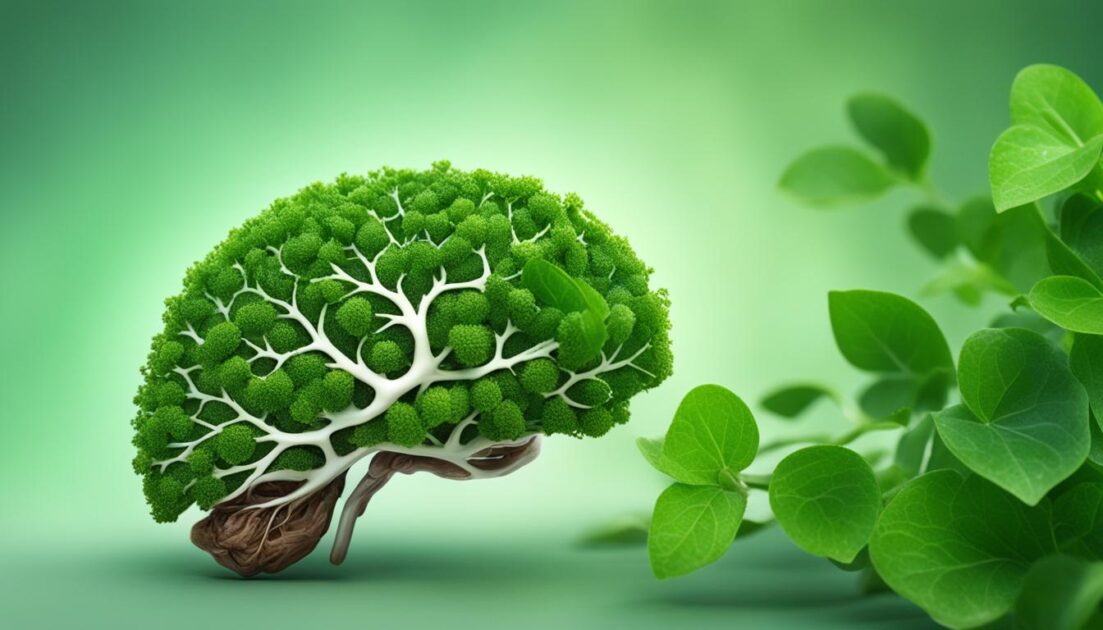Centella asiatica, commonly known as Gotu Kola, is a versatile herb with a long history of use in traditional medicine. With its wide range of uses and potential benefits, Gotu Kola has gained popularity in recent years.
In traditional medicine practices in India, China, and Indonesia, Gotu Kola has been used for centuries to treat various ailments. Its uses include improving mental clarity, enhancing memory, promoting hair health, aiding wound healing, and reducing anxiety and inflammation.
Gotu Kola is not to be confused with kola nut, as it does not contain caffeine. It is a unique herb known for its natural healing properties and is often used in the form of supplements, teas, and topical applications.
Key Takeaways:
- Gotu Kola is an ancient herb used in traditional medicine.
- It has various uses, including improving memory, promoting hair health, aiding wound healing, and reducing anxiety and inflammation.
- Gotu Kola does not contain caffeine and is not the same as kola nut.
- It is available in the form of supplements, teas, and topical applications.
- Consult a healthcare professional before using Gotu Kola, especially if you have any underlying health conditions or are taking medications.
History and Origin of Gotu Kola

Gotu kola, also known as Centella asiatica, has a long and fascinating history that dates back thousands of years. This ancient herb has been an integral part of traditional medicine in India, China, and Indonesia, where it has been used for its numerous health benefits and healing properties.
In traditional Ayurvedic medicine, gotu kola holds a special place for its rejuvenating effects. It has been revered as a potent herb that supports brain function, enhances memory, and promotes longevity. With its extensive use in traditional healing practices, gotu kola has earned other names such as Brahmi, Centella, Indian pennywort, and Luei gong gen.
The origin of gotu kola can be traced back to the wetlands and marshy areas of Asia. It grows abundantly in regions with tropical climates, particularly in India, China, and other Southeast Asian countries. Throughout history, these vibrant green leaves have been harvested and prepared in various forms, including extracts, powders, and teas, to harness their medicinal properties.
The Cultural Significance
“Gotu kola has played a vital role in the traditional practices of Ayurveda, Chinese medicine, and Indonesian folklore, earning its place as a revered herb for its multitude of therapeutic uses.”
The historical significance of gotu kola extends beyond its medicinal applications. It has become an integral part of cultural traditions and celebrations in many Asian communities. From its auspicious presence in spiritual rituals to its symbolic representations in art and literature, gotu kola holds a special place in the cultural fabric of these regions.
Today, the rich history and traditional uses of gotu kola have captured the attention of modern science. Researchers are continuously exploring its therapeutic potential and uncovering new applications for this ancient herb.
| Key Points |
|---|
| Gotu kola (Centella asiatica) has been used in traditional medicine for thousands of years in India, China, and Indonesia. |
| In Ayurvedic medicine, gotu kola is known for its rejuvenating properties and is used to enhance brain function and promote longevity. It is also called Brahmi, Centella, Indian pennywort, and Luei gong gen. |
| The herb is widely grown in tropical regions of Asia and holds significant cultural importance in many communities. |
Properties and Key Components of Gotu Kola
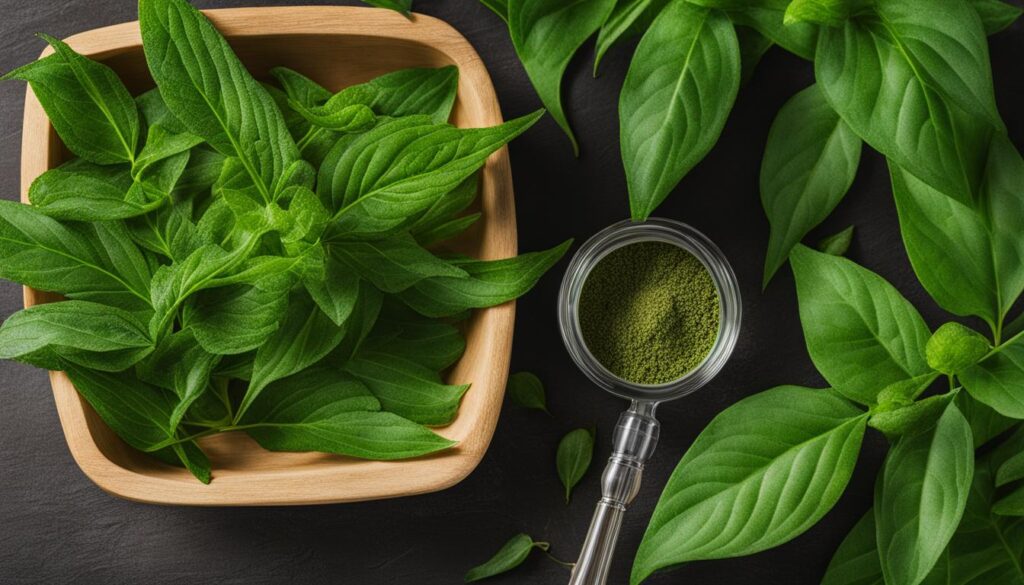
Gotu kola, also known as Centella asiatica, is a medicinal herb that possesses numerous properties beneficial to human health. Its key components contribute to its diverse range of therapeutic effects.
- Triterpenoids: Gotu kola contains triterpenoids, including asiaticoside, asiatic acid, and madecassic acid. These compounds are believed to be responsible for the herb’s healing and anti-inflammatory properties.
- Glycosides: Glycosides are another important component found in gotu kola. They contribute to the herb’s medicinal properties and overall health benefits.
- Flavonoids: Flavonoids are a group of compounds that have antioxidant properties. Gotu kola is rich in flavonoids, which help protect cells from oxidative stress and promote overall well-being.
- Saponins: Saponins are natural compounds with diverse biological activities. Gotu kola contains saponins, which contribute to its therapeutic effects, including anti-inflammatory and wound healing properties.
The combination of these key components in gotu kola gives the herb its unique properties, making it a valuable asset in traditional medicine and natural health remedies.
For a visual representation of the key components of gotu kola, refer to the table below:
| Triterpenoids | Glycosides | Flavonoids | Saponins |
|---|---|---|---|
| Asiaticoside | |||
| Asiatic acid | |||
| Madecassic acid |
Natural Usage for Culinary, Personal Products, Household, and Other Topical Uses
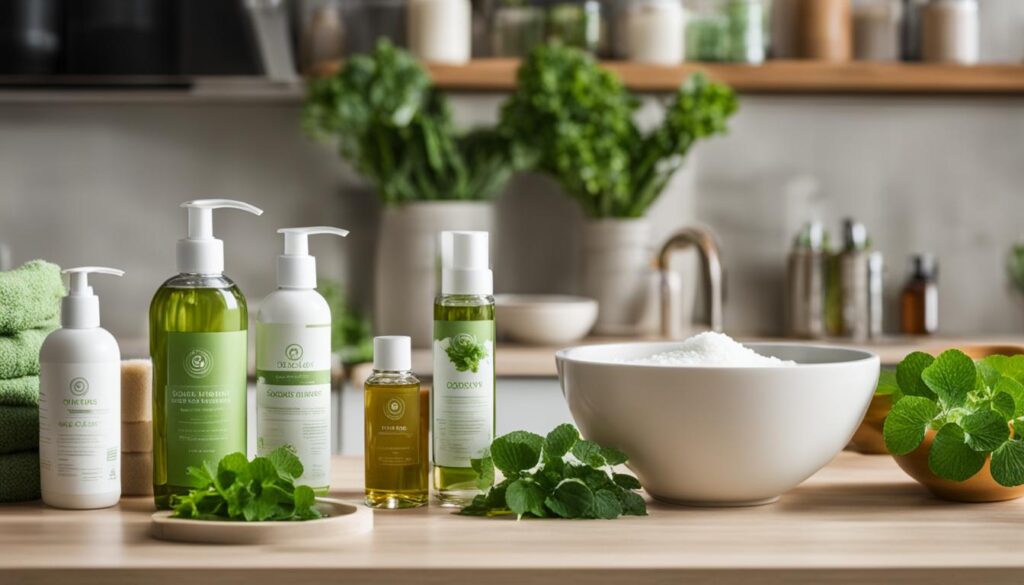
Gotu kola, with its myriad health benefits, finds natural usage in various aspects of our daily lives. From culinary delights to personal care products, household applications, and topical treatments, Gotu kola offers a range of natural solutions.
Culinary Uses of Gotu Kola
In traditional cuisines, especially in Asian countries, Gotu kola is a popular ingredient. Its fresh leaves are added to salads, soups, and stir-fries, providing a unique taste and a nutritional boost.
Personal Products with Gotu Kola
Recognizing the nourishing and anti-aging properties of Gotu kola, it is commonly used as an ingredient in personal care products. Cosmetics, creams, lotions, and hair care products often harness the rejuvenating power of Gotu kola to promote healthy skin and hair.
Household Uses of Gotu Kola
Gotu kola extends beyond the kitchen and the bathroom cabinet. It can also be utilized for various household applications. For example, Gotu kola contains natural mosquito repellent properties, making it an effective alternative to chemical-based repellents. Additionally, it can be a key ingredient in homemade cleaning solutions, providing a natural and safe way to keep your home clean and fresh.
Topical Uses of Gotu Kola
Gotu kola has long been revered for its topical uses and its ability to promote wound healing and reduce inflammation. When applied to the skin, Gotu kola can speed up the healing process, improve skin conditions such as psoriasis and stretch marks, and soothe irritations caused by inflammation.
To fully understand the natural uses of Gotu kola, let’s explore some specific examples:
| Culinary | Personal Products | Household | Topical |
|---|---|---|---|
| – Soups, salads, and stir-fries | – Cosmetics and creams | – Natural mosquito repellent | – Wound healing |
| – Traditional dishes in Asian cuisines | – Lotions and hair care products | – Ingredient in homemade cleaning solutions | – Reducing inflammation |
Benefits and Applications of Gotu Kola
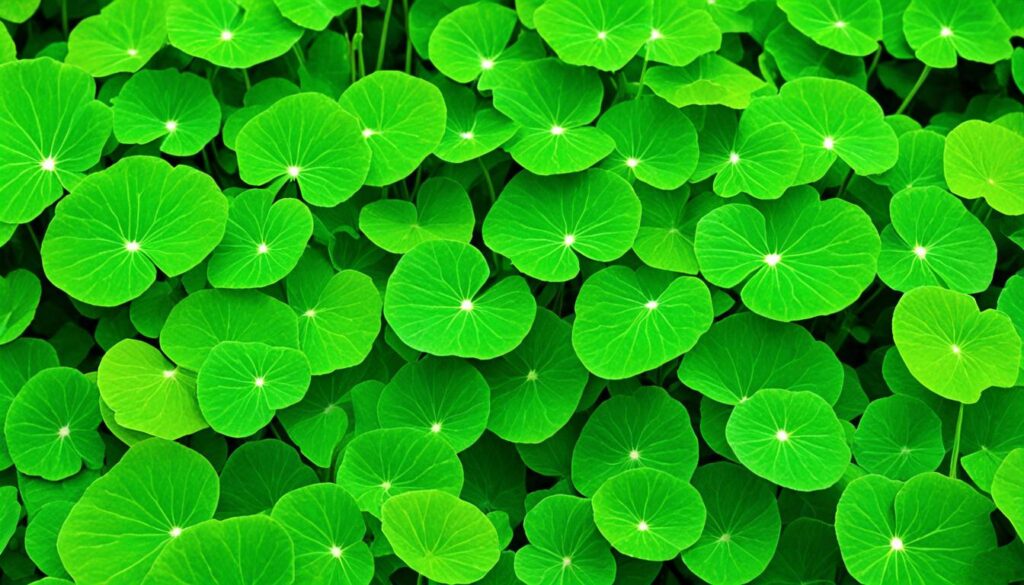
Gotu kola, with its numerous health benefits and versatile applications, has gained significant popularity in the wellness industry. Let’s explore some of the remarkable benefits and applications of this ancient herb.
Enhanced Memory and Cognitive Function
Gotu kola has been traditionally valued for its potential to enhance memory and cognitive function. It is believed to support brain health by promoting blood circulation and stimulating the production of essential brain chemicals.
Stress Reduction and Anxiety Relief
In today’s fast-paced world, managing stress and anxiety is crucial for overall well-being. Gotu kola contains compounds that possess anti-anxiety properties, helping to reduce stress levels and promote a sense of calm and relaxation.
Wound Healing and Collagen Production
Gotu kola has been widely recognized for its wound healing properties. It aids in the production of collagen, a protein essential for skin elasticity and tissue repair. By stimulating collagen synthesis, Gotu kola promotes faster healing and reduces the chances of scarring.
Improved Circulation and Reduced Inflammation
Studies have shown that Gotu kola may improve blood circulation and reduce inflammation in the body. This can contribute to overall cardiovascular health and potentially alleviate conditions associated with poor circulation and chronic inflammation.
Enhanced Skin Health
Gotu kola’s rejuvenating properties make it a popular ingredient in skincare products. It can help improve skin conditions such as acne, eczema, and psoriasis, leaving the skin looking healthy and radiant.
Applications Table
| Application | Description |
|---|---|
| Cognitive Health | Enhances memory and cognitive function |
| Stress Relief | Reduces anxiety and promotes relaxation |
| Wound Healing | Stimulates collagen production and accelerates wound healing |
| Circulation | Improves blood circulation and reduces inflammation |
| Skin Health | Helps improve skin conditions and promotes a youthful complexion |
With its incredible range of benefits and applications, Gotu kola proves to be a versatile and valuable herbal remedy.
Usage Tips and Cautions for Gotu Kola
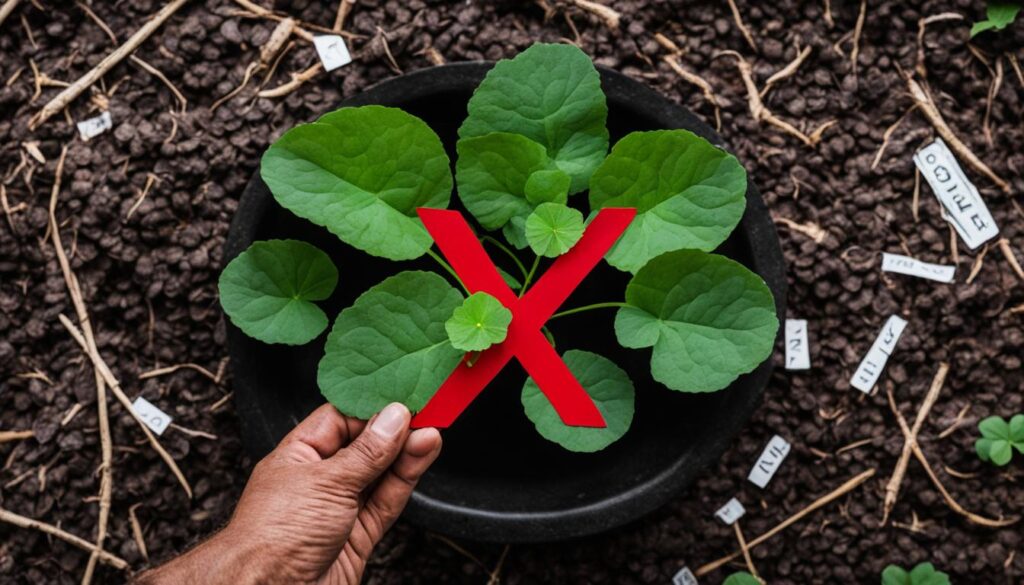
When it comes to using gotu kola, there are some important tips and precautions to keep in mind. Follow these guidelines to ensure safe and effective usage:
Usage Tips for Gotu Kola
- Always follow the recommended dosage instructions provided on the product label or as advised by a healthcare professional.
- It is generally recommended to take gotu kola for a limited period of time, typically two to six weeks, and then take a break before resuming use. This helps prevent potential side effects and allows your body to readjust.
- Consider starting with a lower dose and gradually increasing it to assess your tolerance and response to gotu kola.
- If you have any concerns or questions about using gotu kola, consult with a healthcare professional or herbalist for personalized advice.
Cautions for Gotu Kola
While gotu kola is generally well tolerated, there are certain precautions to be aware of:
- Gotu kola may interact with certain medications, especially those that affect the liver or have sedative effects. It is important to consult with a healthcare professional before using gotu kola, particularly if you are taking other medications.
- Pregnant and breastfeeding women should avoid the use of gotu kola due to the limited safety data available. It is always best to err on the side of caution during these periods.
- Individuals with liver disease or a history of skin cancer should also avoid the use of gotu kola, as it may not be suitable for their specific health conditions.
- If you experience any adverse reactions or unusual symptoms while using gotu kola, discontinue use and consult a healthcare professional.
By following these usage tips and cautions, you can optimize the benefits of gotu kola while minimizing any potential risks or complications.
Selecting the Best Quality Gotu Kola
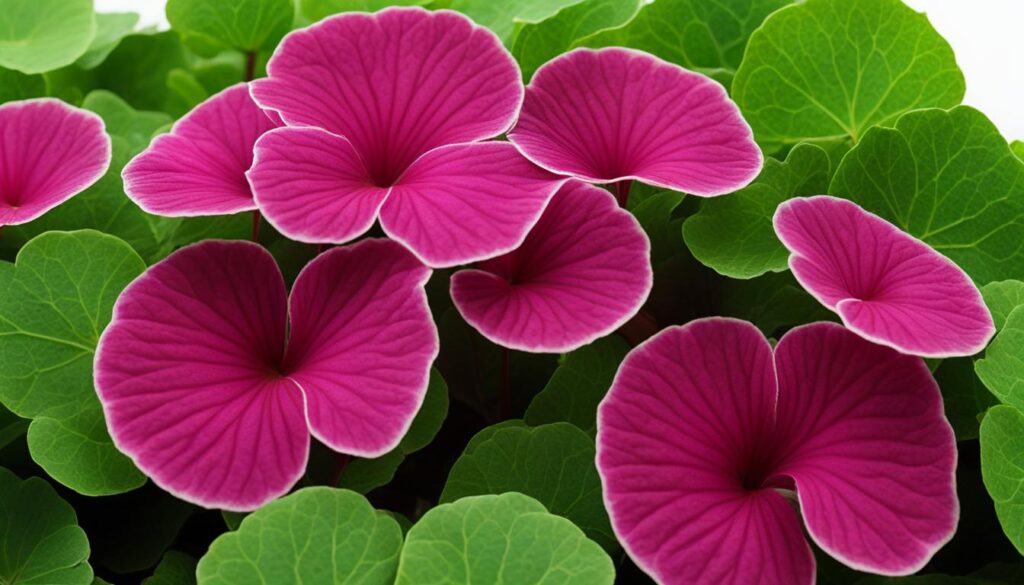
When it comes to purchasing gotu kola, selecting the best quality is essential to ensure its effectiveness and safety. Here are some key considerations to keep in mind:
- Choose reputable sources: Look for products from trusted and reputable sources that adhere to quality and safety standards. This can help ensure that the gotu kola you are buying is of the highest quality.
- Opt for organic or sustainably sourced: To ensure the purity of gotu kola and avoid exposure to harmful pesticides or contaminants, consider choosing organic or sustainably sourced options. These products are grown without the use of synthetic chemicals, preserving the natural integrity of the herb.
- Check for third-party certifications: Look for third-party certifications or testing to further validate the quality, purity, and potency of the gotu kola product. These certifications provide an extra layer of assurance that the product has been tested for safety and efficacy.
- Consult with a healthcare professional: If you are unsure about which gotu kola product to choose or want recommendations on trusted brands or sources, consult with a healthcare professional or herbalist. They can provide tailored advice based on your specific needs and guide you towards the best options available.
By keeping these factors in mind, you can confidently select the best quality gotu kola for your needs, ensuring you receive its full benefits.
For a more detailed look at the factors to consider when selecting gotu kola, refer to the table below:
| Factors to Consider | Description |
|---|---|
| Reputable Sources | Choose products from trusted and reputable sources. |
| Organic or Sustainably Sourced | Opt for products that are organic or sustainably sourced to ensure purity and minimize exposure to contaminants. |
| Third-Party Certifications | Check for third-party certifications or testing to validate the quality, purity, and potency of the product. |
| Consult with a Healthcare Professional | Seek guidance from a healthcare professional or herbalist for personalized recommendations on trusted brands or sources. |
Proper Storage of Gotu Kola
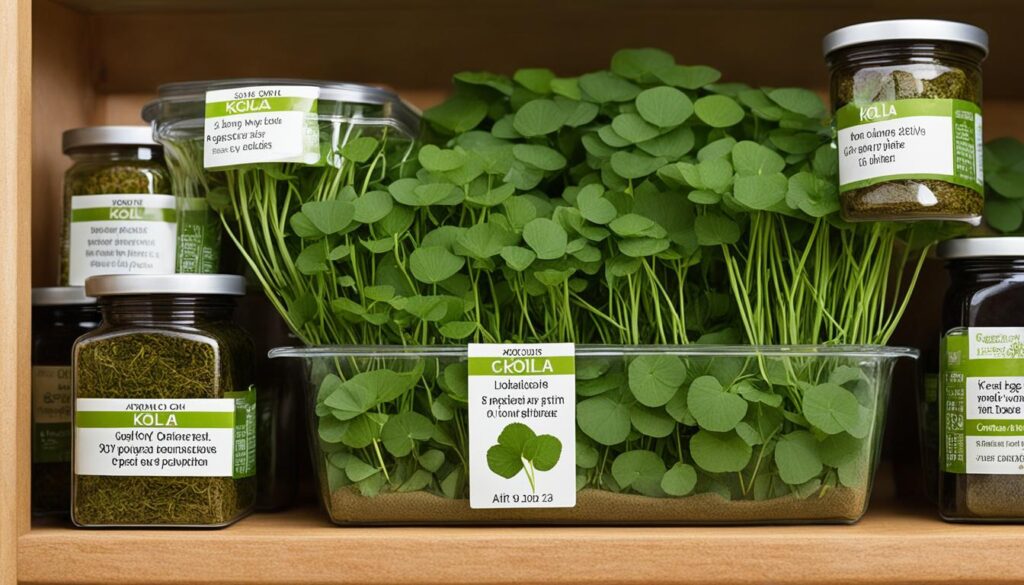
To maintain the quality and potency of gotu kola, it is important to store it properly.
Here are some tips for storage:
- Store dried gotu kola leaves and other forms of gotu kola in a cool, dry place away from direct sunlight.
- Keep the product in an airtight container or resealable bag to protect it from moisture and air exposure.
- Check the expiration date on the packaging and use the product before it expires for maximum effectiveness.
By following these storage guidelines, you can ensure that your gotu kola retains its quality and potency for a longer period of time.
| Storage Tips | Benefits |
|---|---|
| Store in a cool, dry place | Prevents moisture damage |
| Airtight container | Protects from air exposure |
| Check expiration date | Ensure maximum effectiveness |
Incorporating these storage practices into your routine will help you get the most out of your gotu kola and ensure that it remains fresh and potent for your intended use.
Pediatric Use of Gotu Kola
Gotu kola, a herb with various medicinal properties, is generally not recommended for use in children under the age of 18. The safety and effectiveness of gotu kola in pediatric populations have not been extensively studied, therefore it is advisable to avoid its use in children.
If you have any concerns or questions regarding the use of gotu kola in children, it is best to consult with a healthcare professional. They can provide guidance and recommendations based on the specific needs and health conditions of the child.
While gotu kola has been traditionally utilized for its healing properties, careful consideration should be given to its usage in pediatric populations. As with any herbal supplement or medication, it is essential to prioritize the well-being and safety of children by seeking professional advice.
Geriatric Use of Gotu Kola
As we age, our bodies may become more susceptible to the effects of medications and herbal supplements. When considering the use of gotu kola in individuals over the age of 65, it is important to approach it with caution and consult a healthcare professional.
Incorporating gotu kola into a geriatric individual’s daily routine should involve starting with a lower dose and gradually increasing it over time. This allows the body to adjust and helps minimize the risk of any adverse effects.
If you or a loved one is considering using gotu kola as a dietary supplement, it is recommended to have a discussion with a healthcare professional. This is especially crucial if there are any existing health conditions or medications in play. A healthcare professional can provide personalized guidance and assess the potential interactions between gotu kola and other medications.
Remember, safety should always come first, and it is essential to prioritize the well-being and health of geriatric individuals when incorporating gotu kola or any other herbal supplement into their routine.
For more information on the benefits and applications of gotu kola, please refer to the previous sections of this article.
Potential Interactions with Medications
When considering the use of Gotu Kola, it is essential to be aware of potential interactions with certain medications. Gotu kola may interact with medications that affect the liver or have sedative effects. It is crucial to consult with a healthcare professional or pharmacist before using Gotu Kola if you are taking any prescription medications.
Interactions with medications:
- Drugs that affect the liver
- Cholesterol-lowering medications
- Diabetes medications
- Diuretics
- Sedatives
It is important to inform your healthcare professional about any herbal supplements or over-the-counter medications you are taking to avoid potential interactions.
| Medications | Potential Interactions |
|---|---|
| Drugs that affect the liver | Gotu kola may affect the metabolism of medications that are processed in the liver, potentially leading to altered drug levels in the body. |
| Cholesterol-lowering medications | There is a possibility that Gotu kola may interact with cholesterol-lowering medications, which could affect their efficacy. |
| Diabetes medications | Gotu kola may have hypoglycemic effects, potentially impacting the effectiveness of diabetes medications. |
| Diuretics | There is a potential for interactions between Gotu kola and diuretics, which could lead to altered fluid balance in the body. |
| Sedatives | Gotu kola may enhance the sedative effects of medications, which could result in increased drowsiness or dizziness. |
It is always important to consult with a healthcare professional or pharmacist before incorporating Gotu Kola into your medication regimen. They can provide personalized advice and guidance based on your specific health needs and medications.
Side Effects and Risks of Gotu Kola
While Gotu kola is generally well tolerated, it can cause some side effects in certain individuals. These side effects may include headaches, upset stomach, dizziness, or skin irritation. If you experience any of these symptoms, it is advisable to discontinue use and consult with a healthcare professional.
To minimize the risk of side effects, it is recommended to start with a low dose of Gotu kola and gradually increase it over time. This allows your body to adapt to the herb and reduces the chances of adverse reactions. It is important not to exceed the recommended dosage and duration of use specified on the packaging or as advised by a healthcare professional.
There are certain groups of people who should avoid using Gotu kola. Pregnant and breastfeeding women should refrain from using this herb, as its effects on fetal development and breastfeeding infants are not well understood. Individuals with liver disease or a history of skin cancer should also avoid using Gotu kola, as it may exacerbate these conditions. As always, it is crucial to consult with a healthcare professional before incorporating Gotu kola into your routine, especially if you have any underlying health conditions or are taking medications.
In summary, while Gotu kola offers potential health benefits, it is important to be aware of its possible side effects and risks. By following the recommended dosage, consulting with a healthcare professional, and being vigilant about any adverse reactions, you can safely incorporate Gotu kola into your wellness routine.
FAQ
What are the uses and benefits of Gotu Kola?
Gotu Kola has a wide range of uses and potential health benefits. It has been used to improve memory and cognitive function, promote calmness and relaxation, enhance wound healing, improve circulation, reduce inflammation, and promote skin health.
What is the history and origin of Gotu Kola?
Gotu Kola, also known as Centella asiatica, has been used for thousands of years in traditional medicine in India, China, and Indonesia. It is considered a rejuvenating herb in Ayurvedic medicine and has been used to promote longevity and improve overall health.
What are the properties and key components of Gotu Kola?
Gotu Kola contains various compounds that give it its medicinal properties, including triterpenoids, glycosides, flavonoids, and saponins. The triterpenoids, such as asiaticoside, asiatic acid, and madecassic acid, are believed to be responsible for its healing and anti-inflammatory effects.
How is Gotu Kola used in culinary, personal products, household, and topical applications?
Gotu Kola is commonly used in traditional cuisines, added to salads, soups, and stir-fries. It is also used as an ingredient in personal care products, such as creams, lotions, and hair care products, due to its nourishing and anti-aging properties. Additionally, it can be used as a natural mosquito repellent and in homemade cleaning solutions.
What are the benefits and applications of Gotu Kola?
Gotu Kola has various benefits and applications. It can enhance memory and cognitive function, promote calmness and relaxation, improve wound healing, circulation, and skin health, reduce inflammation, and potentially have anti-aging effects.
What are some usage tips and cautions for Gotu Kola?
When using Gotu Kola, it is important to follow the recommended dosage instructions and take breaks after a limited period of use. Pregnant and breastfeeding women, individuals with liver disease, or a history of skin cancer should avoid its use. Additionally, it may interact with certain medications, so consulting with a healthcare professional is advised.
How can I select the best quality Gotu Kola?
To ensure the quality and safety of Gotu Kola, choose products from reputable sources that adhere to quality and safety standards. Look for organic or sustainably sourced options and check for third-party certifications or testing to ensure purity and potency.
What are the proper storage methods for Gotu Kola?
To maintain the quality and potency of Gotu Kola, store it in a cool, dry place away from direct sunlight. Keep it in an airtight container or resealable bag to protect it from moisture and air exposure. Check the expiration date and use the product before it expires.
Can Gotu Kola be used in pediatric populations?
Gotu Kola is not recommended for use in children under the age of 18. The safety and efficacy of Gotu Kola in pediatric populations have not been well studied.
How should Gotu Kola be used by geriatric individuals?
For geriatric individuals, it is recommended to start with a lower dose of Gotu Kola and gradually increase it over time. Geriatric individuals may be more susceptible to the effects of medications and herbal supplements, so guidance from a healthcare professional is important.
Are there potential interactions between Gotu Kola and medications?
Gotu Kola may interact with certain medications, especially those that affect the liver or have sedative effects. It is important to consult with a healthcare professional or pharmacist before using Gotu Kola if you are taking any prescription medications.
What are the possible side effects and risks associated with Gotu Kola?
Gotu Kola is generally well tolerated, but some individuals may experience side effects such as headache, upset stomach, dizziness, or skin irritation. It is important to start with a low dose and not exceed the recommended dosage and duration of use. Pregnant and breastfeeding women, individuals with liver disease, or a history of skin cancer should avoid its use.
